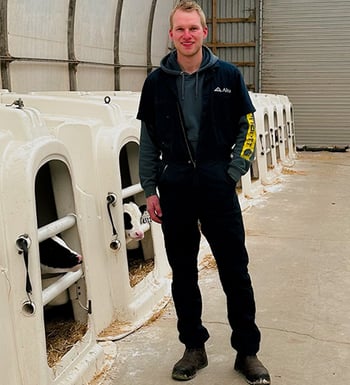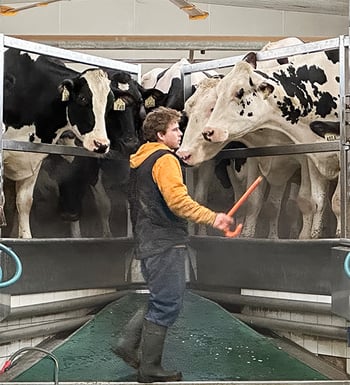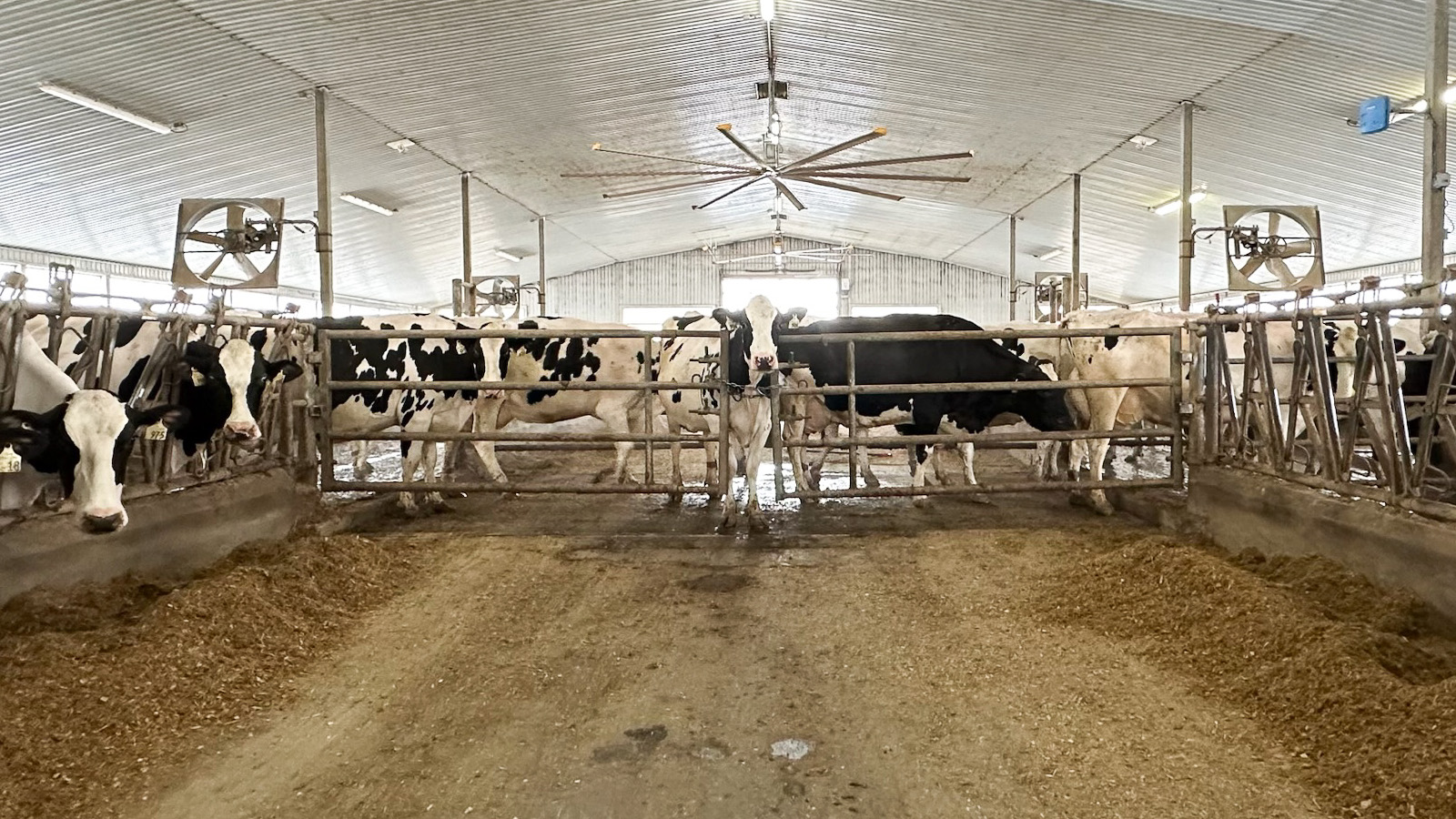From Farm to Milk Glass, How We Support Dairy Farmers and Work Toward Food Security
Recognizing the unique challenges that comes with operating a farm is something we understand. Not only are we the second largest agricultural credit union lender in Ontario, several Kindred staff members happen to own farms, themselves. That means we have decades of experience in working with agriculture – from finance to field, to table!
 Kindred’s purpose of providing cooperative banking that connects values and faith with finances inspiring peaceful, just, and prosperous communities certainly extends to agriculture. The agriculture and agri-food sector are major contributors to the Canadian economy, and in Ontario, the dairy industry is at the top. According to the DFO, as the largest sector of Ontario agriculture, dairy produces $1.8 billion worth of milk annually across 3,300 dairy farms in Ontario, many of which are family-run.
Kindred’s purpose of providing cooperative banking that connects values and faith with finances inspiring peaceful, just, and prosperous communities certainly extends to agriculture. The agriculture and agri-food sector are major contributors to the Canadian economy, and in Ontario, the dairy industry is at the top. According to the DFO, as the largest sector of Ontario agriculture, dairy produces $1.8 billion worth of milk annually across 3,300 dairy farms in Ontario, many of which are family-run.
Milky Wave Dairy, located in Elmira, is one of those family-run dairy farms of over 200 cows by eleventh-generation farmer, Jim Schuurmans. Dairy farming is in his blood; his father Henk was the manager of the farm before they bought it in 2013 and changed the name, and the family roots trace back to dairy farmers in the Netherlands.
“It’s a lifestyle,” says Jim about dairy farming being in his blood. “Yeah, we enjoy it. It's go, go, go, but if we didn't enjoy it, we wouldn't be doing the work either.”
For dairy farmers like Jim, dairy farming is a way of life and an important part of the Ontario agriculture ecosystem. Educating the public of dairy farming, from highlights, to challenges, to responsible farming, is the Dairy Farmers of Ontario (DFO). The DFO’s stance on responsible and ethical farming resonates with us at Kindred, with our concerns of food security, particularly as they operate as a regulatory body for a system called “supply management.”
Supply management in dairy – as well as the poultry sectors – refers to producing the exact amount of milk required by Ontario milk processors to meet consumer demand, as explained by the DFO. They continued: “The total amount of quota owned by individual farmers across the province must result in the collective production of precisely the volume of milk required by processors.”
That means that if the demand for milk is at 2.5 billion litres per year, dairy farms and farmers must collectively produce and process that exact number. If they are under it, more dairy farms are needed. However, encouraging people to become dairy farmers isn’t easy.
To raise awareness about dairy farming and all associated aspects of it, the DFO’s marketing and educational body works with local regional dairy chapters – the Dairy Producer Committee – to educate the average Ontarian about milk. This is done through school programs, milk donations, promotional campaigns, and milk calendars. It’s not just about why milk is important to consume for our health – the educational programs are about dairy farms, dairy farming as a lifestyle, the necessary roles to maintain a dairy farm, and the health of the cows, too.
It’s something Jim wishes more people knew—dairy farmers put their cows first. “Our cows are well cared for,” he explains. “We feed them and milk them before we have our breakfast. The first thing we do is tend to them, and honestly? They’re looked after better than some people are!”
 To ensure his cow’ wellness, Jim uses technology, similar to a Fitbit, to monitor their activity throughout the day. It has an ID and all their data on a chip, logging not just the liters that they produce, but the conductivity (such as the salt in the milk). It allows farmers to monitor their health, including their lying time and standing time; anything that is abnormal is flagged early on and quickly rectified.
To ensure his cow’ wellness, Jim uses technology, similar to a Fitbit, to monitor their activity throughout the day. It has an ID and all their data on a chip, logging not just the liters that they produce, but the conductivity (such as the salt in the milk). It allows farmers to monitor their health, including their lying time and standing time; anything that is abnormal is flagged early on and quickly rectified.
The challenge for dairy farmers, is of course, the shrinking amount of farm land, the lack of interest in dairy farming or farming in general, and the dietary shifts away from milk for milk alternatives or due to allergies. Despite those challenges, Jim doesn’t think that dairy farmers are going anywhere.
“A lot of it is perception. Dairy farms will just have to get bigger or adapt their technology,” he explains. ”People don't drink as much fluid milk, but they eat more cheese and yogurt. When I grew up as a kid, you drank milk with your cereal or drank a cup of milk. Now, it's more likely you will get your milk source from a protein shake or something similar.”
Dairy farming is a vocation; it’s hard work and it’s a lifestyle. The work and effort that goes into being a dairy farmer involves animal handling, working with equipment – including the inspection, maintenance, and fixing of anything electrical or plumbing – as well as the business side of farming. Being able to turn farming into a viable business so that people can build a life around it is another important aspect.
Jim notes there’s two sides to farming as a business owner: handling the feed mills, milk dealerships, truck supply and transport, veterinarians, and then the financial part, from earning an income, managing and paying employees, and farm upkeep. With dairy employing more than 222,000 Canadians, having the right support to explore options, set goals, and grow the business is necessary.
At Kindred Credit Union, our team has experience in all aspects of banking for farmers from cash crops to livestock, from barn construction to robotic milking. Furthermore, we’re deeply interested in unpacking how we can collectively lean into the connections that food creates and explore how bridges can be built between finances, farm, and local partners.
Part of the Community Inspiration Framework, focusing on food security is a main concern of ours, like milk is a concern for dairy farmers. Just like the DFO works with the Dairy Producer Committee to address concerns about milk accessibility, we’ve partnered with organizations on a provincial, national, and international scale and directly gift local organizations through our Charitable Fund or support investors with a “bonus interest” option through our Community Inspiration GIC to focus on food security.
Community food security is a complex issue that requires a multi-faceted approach to finding solutions, whether that is education, donations, food drives, or milk programs. We know that by supporting local organizations working to address community food security, our communities will feel the benefits. Kindred Credit Union is committed to doing what we can to support food security across our local communities, alongside dairy farmers like Jim Schuurmans, and others.
Learn more about dairy farming in Ontario:
Dairy Farmers of Ontario (DFO)

